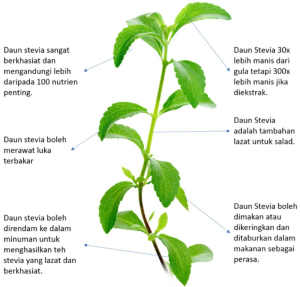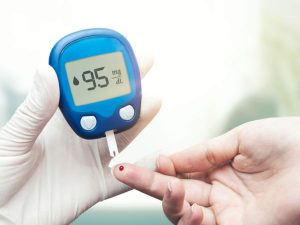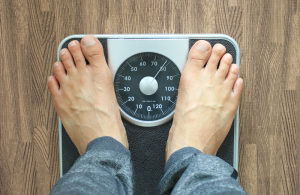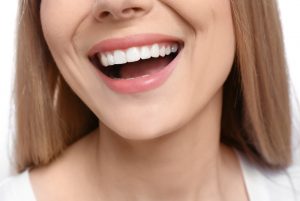
Info Stevia
- Sejenis herba yang dikenali sebagai pokok gula.
- Nama saintifiknya ialah Stevia rebaudiana.
- Berasal dari Paraguay.
- Digunakan ratusan tahun di Paraguay untuk memaniskan teh dan ubat-ubatan.
- Pemanis stevia pertama dikomersialkan di Jepun oleh sebuah syarikat Jepun iaitu Morita Kagaku Kogyo pada 1971.
- Stevia digunakan secara meluas didalam minuman dan masakan rakyat Jepun.
Stevia is a sweetener and sugar substitute derived from the leaves of the plant species Stevia rebaudiana, native to Brazil and Paraguay. The active compounds are steviol glycosides (mainly stevioside and rebaudioside), which have 30 to 150 times the sweetness of sugar,[3] are heat-stable, pH-stable, and not fermentable.[4] The body does not metabolize the glycosides in stevia, so it contains zero calories like some artificial sweeteners. Stevia’s taste has a slower onset and longer duration than that of sugar, and some of its extracts may have a bitter or licorice-like aftertaste at high concentrations.
The legal status of stevia as a food additive or dietary supplement varies from country to country. In the United States, high-purity stevia glycoside extracts have been generally recognized as safe (GRAS) since 2008, and are allowed in food products, but stevia leaf and crude extracts do not have GRAS or Food and Drug Administration (FDA) approval for use in food.[5] The European Union approved stevia additives in 2011,[6] while in Japan stevia has been widely used as a sweetener for decades.[7]
Benefits of Stevia

1. Benefit: Controls Diabetes
Stevia is an ideal replacement for traditional sugar, especially if you have diabetes or a carbohydrate-controlled diet. That way, you can enjoy sweet foods without dealing with diabetic complications. Unlike normal sugar made of sucrose, stevia contains stevioside. It is a glycoside compound, not a carbohydrate. Table sugar is absorbed into the bloodstream. As stevioside breaks down, the glucose is absorbed in the colon by bacteria.

2. Benefit: Aids in Weight Loss
Compared to natural sugar, stevia is low in calories but just as sweet. Therefore, you can have your helping of candies, cookies, and cakes without packing on the extra pounds caused by sugar. However, you will most likely have to make homemade foods since it can be difficult to find stevia-made pastries. Nevertheless, eating stevia can help you have some control over the sugar intake of your diet if you are trying to lose weight.

3. Benefit: Regulates Blood Pressure
As a type of glycoside, stevia has the potential to relax the blood vessels. It also increases urination, which flushes sodium from the body. In turn, your blood pressure can drop since you have less stress on your cardiovascular system. Studies also revealed stevia could reduce bad cholesterol levels and triglycerides as it increases the healthy cholesterol levels. Taking stevia can protect your heart health and prevent the onset of atherosclerosis, stroke, or heart attack.

4. Benefit: Promotes Oral Health
As sugar eats your teeth and causes cavities, stevia can improve your oral health. Studies found that eating stevia can help reduce bacteria in your mouth. The extract is even used in many types of mouthwash and toothpaste. Since stevia prevents cavities instead of making them, it is also a great way to prevent gingivitis and other mouth diseases the way sucrose never will.

5. Benefit: Improves Skin Care
Did you know this sugar substitute can help treat eczema, dermatitis, and other skin ailments? Using the extract as a topical application might stop the spread of bacteria. It also acts as a steroid depending on your situations. Talk to your healthcare provider about using stevia as a way to ease certain symptoms and improve your skin.
